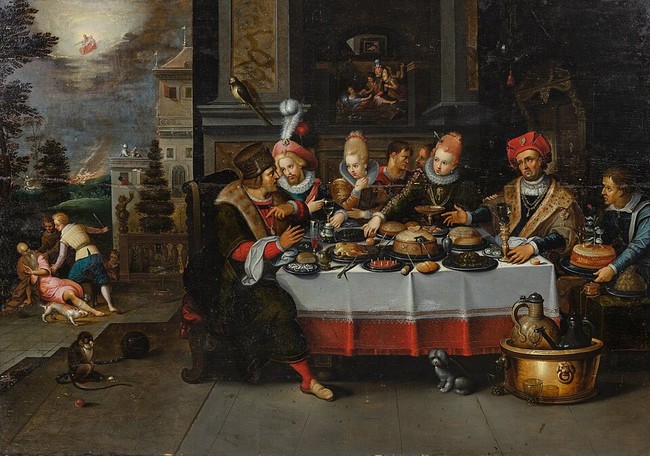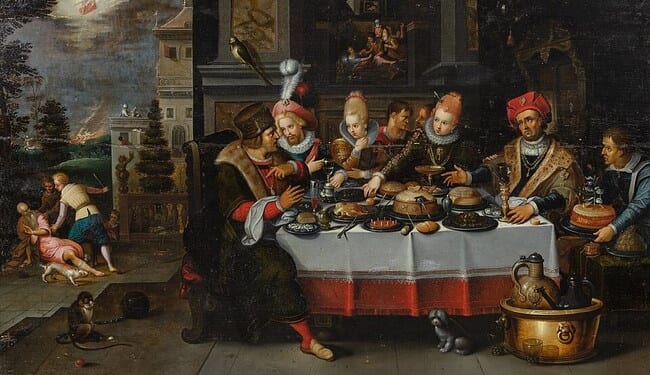
This morning’s Gospel reading is Luke 16:19–31:
Jesus said to the Pharisees:
“There was a rich man who dressed in purple garments and fine linen and dined sumptuously each day. And lying at his door was a poor man named Lazarus, covered with sores, who would gladly have eaten his fill of the scraps that fell from the rich man’s table. Dogs even used to come and lick his sores. When the poor man died, he was carried away by angels to the bosom of Abraham. The rich man also died and was buried, and from the netherworld, where he was in torment, he raised his eyes and saw Abraham far off and Lazarus at his side. And he cried out, ‘Father Abraham, have pity on me. Send Lazarus to dip the tip of his finger in water and cool my tongue, for I am suffering torment in these flames.’
Abraham replied, ‘My child, remember that you received what was good during your lifetime while Lazarus likewise received what was bad; but now he is comforted here, whereas you are tormented. Moreover, between us and you a great chasm is established to prevent anyone from crossing who might wish to go from our side to yours or from your side to ours.’ He said, ‘Then I beg you, father, send him to my father’s house, for I have five brothers, so that he may warn them, lest they too come to this place of torment.’
But Abraham replied, ‘They have Moses and the prophets. Let them listen to them.’ He said, ‘Oh no, father Abraham, but if someone from the dead goes to them, they will repent.’ Then Abraham said, ‘If they will not listen to Moses and the prophets, neither will they be persuaded if someone should rise from the dead.’”
Today as I write this, I will begin preparing for my work in the church choir. I love working with the choir at my parish; it is a highly collaborative experience, where everyone works together as an ensemble. To do this, we have to adhere to the hymns as written, or on rare occasions when we choose to deviate from the sheet music, to do so together and in concert with each other. We do this because we know this is how we can best perform, how we can best praise the Lord, and how we can support the liturgy without attracting attention to a “performance” rather than facilitating prayer.
I’m not saying we always succeed at this. We are small (but mighty!), human, and don’t always stick the landing. However, we know that we must work together and put the whole above the individual to have any hope of succeeding as a group.
Today’s first reading from Amos reflects on that, and on the nature of sin and its effects. The Lord speaks through the prophet to warn the Israelites that they have chosen to sate themselves and reject His word rather than remember that they serve Him and not the other way around. One passage in particular called out to me, perhaps because of my preparation for music at Mass today. Emphasis mine:
Thus says the LORD, the God of hosts:
Woe to the complacent in Zion! Lying upon beds of ivory, stretched comfortably on their couches, they eat lambs taken from the flock, and calves from the stall! Improvising to the music of the harp, like David, they devise their own accompaniment. They drink wine from bowls and anoint themselves with the best oils; yet they are not made ill by the collapse of Joseph! Therefore, now they shall be the first to go into exile, and their wanton revelry shall be done away with.
That phrase speaks volumes about the Israelites and their repeated rejection of the Lord. It also reminds me of The Silmarillion, one of my favorite books by J.R.R. Tolkien outside of the Lord of the Rings trilogy. The Silmarillion provides the origin story for Middle Earth. Its first section, titled Ainulindalë, is analogous to the first part of Genesis, clearly Tolkien’s intent. It tells of the higher order (Ainur) of what would be angels called by Eru Ilúvatar (the Lord) to sing Creation into existence.
The Ainur sang of beauty and light, and in accord with one another, except for Melkor, the mightiest of that order. While they sang in harmony with Eru Ilúvatar, Melkor instead devised his own accompaniment, so to speak. This set evil and destruction into the world, but even with that, truth and beauty had not only fought back in the end but also put Melkor’s chaos and cacophony to its own use.
Tolkien was a devout Catholic and knew exactly what he was doing in this passage. He used his own creation to reflect on the origin and purpose of all Creation, only in literary fiction rather than a treatise. Not only did this provide a parable of sorts for the question of why evil exists, but it also gives us a parable as to how sin works in each one of us. Whether Tolkien had Amos 6 in mind when he conceived this is difficult to answer, but he couldn’t have nailed it better if he had.
When we “devise our own accompaniment,” we sin. When we break away from the body of the Church to sing a completely different tune, we put ourselves at risk of sin. In Amos, the Lord warns against this, and in that warning, we know that He has already provided us with the “accompaniment” we need — in the prophets and in the Law.
This brings us to Jesus’ parable and the powerful message He gives to the Pharisees. In this parable, a rich man enjoyed his wealth and ignored the “accompaniment” provided by the Lord during his life. In death, he suffers torment while a poor man named Lazarus is comforted in eternity at Abraham’s side. He begs for mercy, but is rebuked, and then begs Abraham to send Lazarus to warn his family of the consequences of sin. Abraham refuses, and in this Jesus issues a prophetic warning about what would soon come to pass:
He said, ‘Then I beg you, father, send him to my father’s house, for I have five brothers, so that he may warn them, lest they too come to this place of torment.’ But Abraham replied, ‘They have Moses and the prophets. Let them listen to them.’ He said, ‘Oh no, father Abraham, but if someone from the dead goes to them, they will repent.’ Then Abraham said, ‘If they will not listen to Moses and the prophets, neither will they be persuaded if someone should rise from the dead.’”
Of course, that is precisely what Jesus provides to all of us — the sheet music to salvation, provided by the Son of Man raised from the dead.
And yet, we still insist on devising our own accompaniment.
This is not just sin, but it’s a reflection of Original Sin. We insist on snatching authority from the Lord rather than serving Him in love and humility. We refuse to follow the prophets and the Law, and turn our back on the Gospel. We are like Melkor in that sense, not corrupting Creation at its start but corrupting it in small ways to suit our own appetites and ambitions, like the rich man before his death in the parable.
However, we can still hope in the Lord. The song is all around us, in the Word and in the liturgy, begging us to return to His accompaniment. Paul urges Timothy in our second reading to do just that by “pursu[ing] righteousness, devotion, faith, love, patience, and gentleness,” and to “compete well for the faith.” Even when we sing out of tune, in the wrong key, and even get lost by making up our own music, we can stop and listen closely for the song of the Lord in our hearts — always present, even if we stop listening for a while. When we repent and put aside our own cacaphony to listen for that song, we can re-enter it — and be welcomed back into its harmony, sweetness, and joy.
Previous reflections on these readings:
The front page image is “The Rich Man and Lazarus” by Caspar van den Hoecke, c. early 17th century. Via Wikimedia Commons.
“Sunday Reflection” is a regular feature that looks at the specific readings used in today’s Mass in Catholic parishes around the world. The reflection represents only my own point of view, intended to help prepare myself for the Lord’s day and perhaps spark a meaningful discussion. Previous Sunday Reflections from the main page can be found here.
Join Hot Air VIP and use promo code FIGHT to get 60% off your membership!












